Why Did My Cat Pee on My Bed?

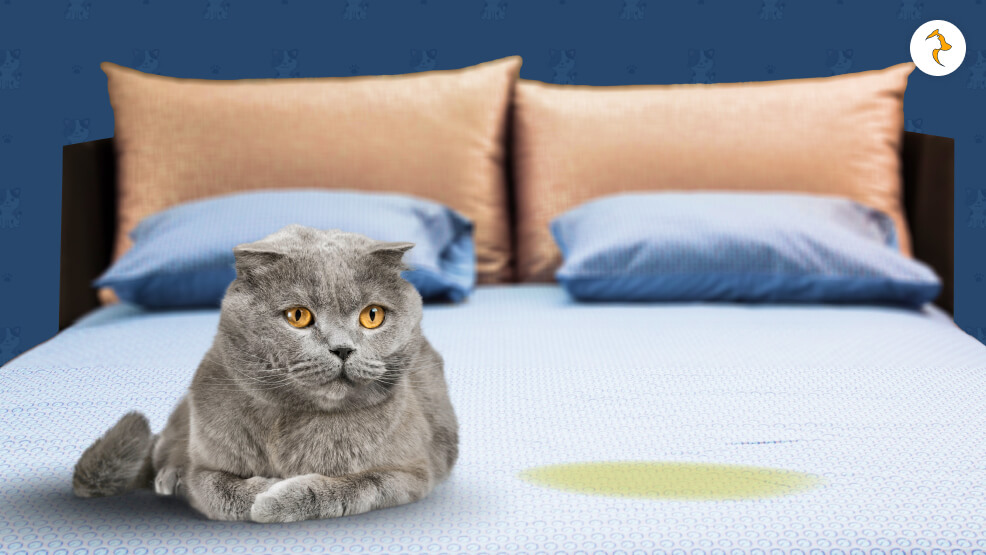
Discovering that your cat has urinated on your bed is frustrating, confusing, and even hurtful. It may be personal, particularly if your cat is otherwise affectionate and well-mannered.
But when a cat urinates on a bed—or any surface except the litter box—it’s never spite. Rather, it’s most likely a sign that something is amiss, medical, behavioral, emotional, or environmental.
Today, we’re going to discuss the most common reasons cats pee on beds, why you shouldn’t let it happen any longer, and how to stop this habit for good.
Why Did My Cat Urinate on My Bed?
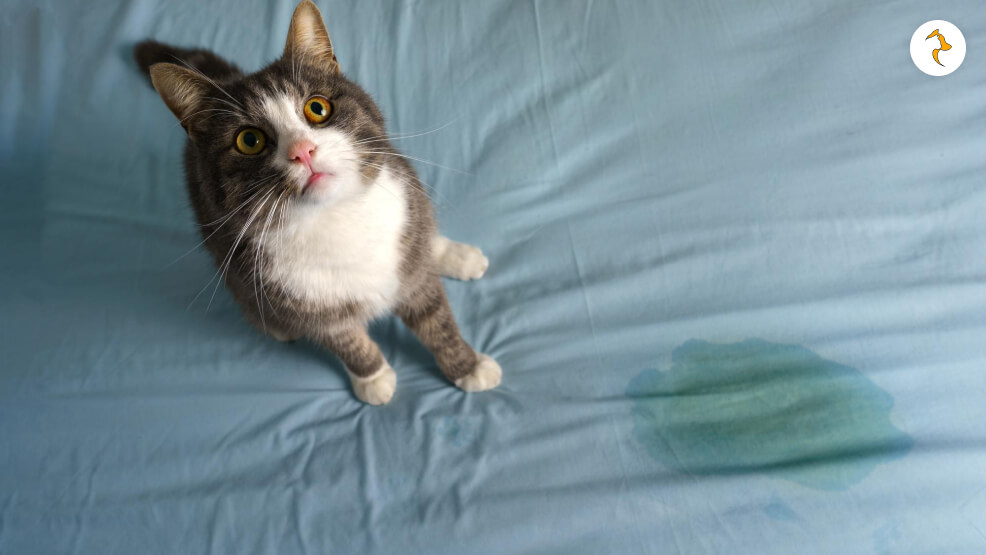
Let’s skip the foreplay and answer the main question first.
1. Medical Problems: The First One to Eliminate
Prior to the assignment of behavioral problems, medical causes must be eliminated. Cats will associate the litter box with pain if they are having an issue with their urinary tract. They’ll either avoid it altogether and seek out softer, more comfortable surfaces—like your bed.
Inappropriate Urination is Also Very Common Many Times Due to These Most Frequent Medical Conditions:
- Urinary Tract Infection (UTI) Symptoms: More frequent urination, hematuria, straining Cats urinate on the bed when they are uncomfortable or experience a sense of urgency.
- Feline Lower Urinary Tract Disease (FLUTD) This is actually a group of painful, inflammatory diseases to urinate.
- Bladder Stones or Crystals They may cause a blockage of the urinary tract and pain or inability to pee normally.
- Kidney Disease It makes one urinate more, typically in the wrong locations.
- Diabetes Mellitus Makes your cat thirsty and make them urinate more, raising the odds of accidents.
What to do: Take your cat to a vet right away if they’ve just recently begun doing this, particularly if they’re exhibiting distress, straining, crying, or repeatedly returning to the litter box.
2. Behavioral and Emotional Reasons
If your veterinarian rules out medical causes, the cause is behavioral or emotional. Cats are sensitive creatures, and stress, environmental change, or emotional state can be the cause of inappropriately eliminating.
Common Behavioral Signs:
1. Anxiety or Stress
Cats become anxious because of:
- Moving to a new house
- Family routine change
- New baby or pet introduction
- Visitors at home
Why the bed? Your bed smells like your self. Cats really do have separation anxiety, and occasionally pee on objects with their smell when upset, in need of comfort, or wish to blend scents to comfort themselves.
2. Territorial Marking
Spayed or neutered cats are going to be more prone to marking territory, particularly mating season or when feeling another animal.
Even neutered animals can spray or pee inappropriately due to territorial conflict with other animals in the household.
3. Separation Anxiety
If you’re away from home more than usual or recently returned from a trip, your cat might urinate on your bed out of stress, confusion, or a need to be close to your scent.
4. Litter Box Aversion
Cats may avoid the litter box if:
- It’s dirty or isn’t scooped on a regular basis
- The litter has been changed to a new kind
- It’s clinking or a thoroughfare
- Another cat is defending the box
If your cat doesn’t like the litter box, they will find a quiet, absorbent, and soft surface to urinate on—your bed.
What Does It Mean When a Cat Urinates on Your Bed?
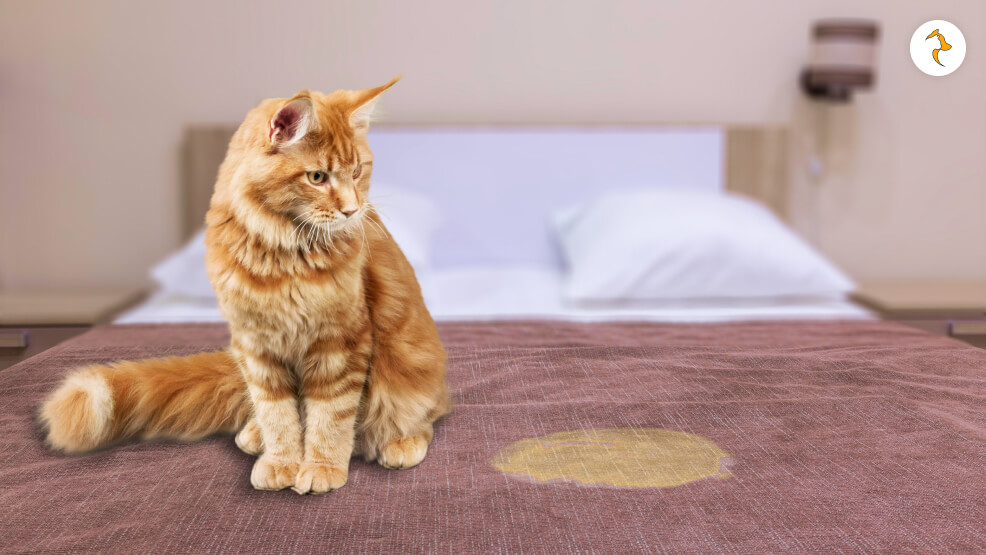
This is a very loaded question for the average owner. Though it might seem one about him or her, in general, it is not.
This might mean:
| Cat’s Behavior | Possible Meaning |
|---|---|
| Suddenly urinates on bed | Urinary infection or stress |
| Repeats action over time | Aversion to litter box, habit formation |
| Pees when returning home | Protest or separation anxiety |
| Peeing close to pillows | Must be near your scent for comfort |
| After change of routine takes place | Anxiety due to altered environment or schedule |
How Can I Prevent My Cat from Peeing on My Bed?
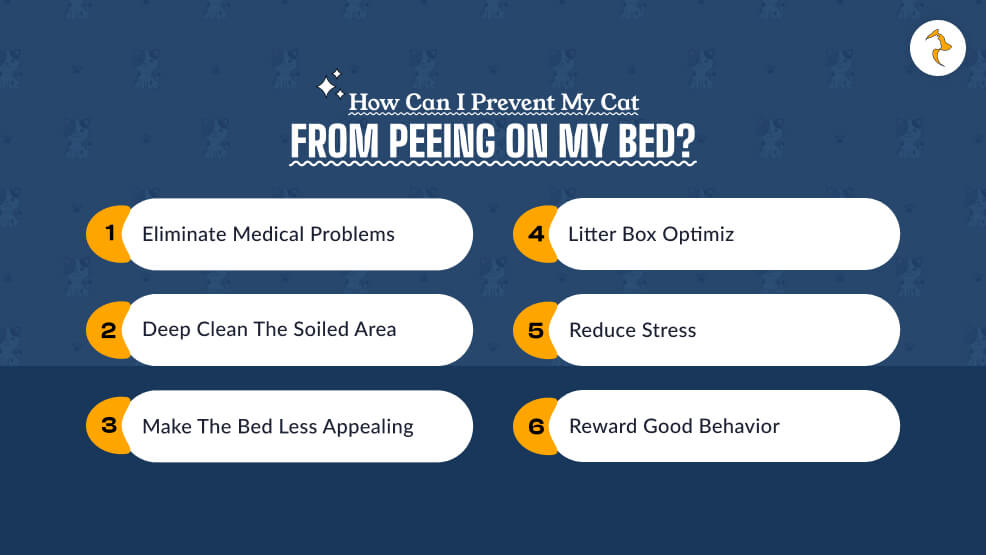
Stopping the behavior is a function of identifying why the cat is peeing on the bed. This is the step-by-step procedure to end the behavior and have it done.
1. Eliminate Medical Problems
Take the cat into a veterinarian for a full urinalysis and physical exam. Fix any issues that are diagnosed.
2. Deep Clean the Soiled Area
Sanitize with an enzymatic cleaner (Nature’s Miracle or Rocco & Roxie) to remove urine odor on a molecular level. Cats will continue peeing in the same spot if they can still detect their previous waste. Do not use ammonia cleaners—they have a urine scent and will most likely cause repeat mishaps.
3. Make the Bed Less Appealing
- Divide the bed by a plastic shower curtain or foil short-term
- Keep your bedroom shut when away from home
- Install a litter box in the bedroom short-term to separate the areas
4. Litter Box Optimize
Ask yourself:
- Is it cleaned every day, and scooped?
- Do you have enough boxes? (Rule: 1 box per cat +1)
- Is the litter box located in a quiet, easily accessible location?
- Change to new litter recently Then you could have to try to change litters, or covered boxes versus open boxes.
5. Reduce Stress
- Provide cat trees, hideaways, and vertical space
- Use Feliway diffusers (synthetic cat pheromones)
- Set up a consistent feeding and play schedule
- Use calming treats or herbal remedies
6. Reward Good Behavior
- Praise and reward your cat for using the litter box
- Make your bedroom a positive zone, not a battlefield
- Stop scolding your cat—it only makes things worse and tenses up the situation
Is My Cat Mad at Me for Something?
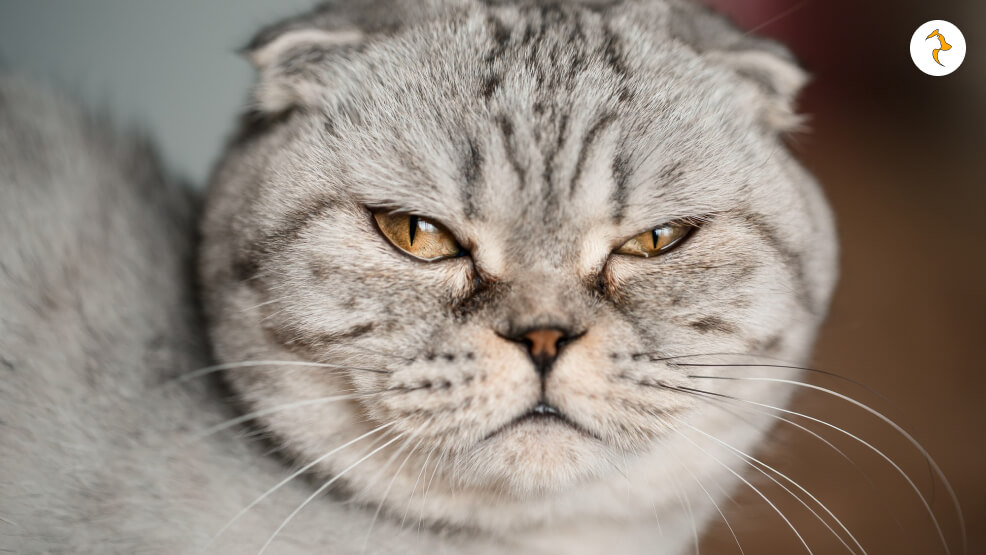
It’s easy to think your cat is being spiteful, but the truth is:
Cats do not pee on beds out of revenge.
They express discontentment, fright, pain, or stress behaviorally. Peeing in the bed indicates that your cat is experiencing something they are unable to tell you.
Rather than considering it as a form of revenge, try to see it as a means of non-verbal communication—a communication type that implies distress and requires your intervention.
Yes. Cats are highly territorial and can be taken aback by new animals or even new humans at home.
If you have just introduced:
- A new cat or dog
- A new baby
- A new roommate or spouse
Your cat may feel insecure or displaced.
To fix this:
- Offer safe spaces separate for your cat
- Use slow introduction to new pets
- Don’t force contacts
- Encourage spending time with your cat
What If My Cat Is Old?
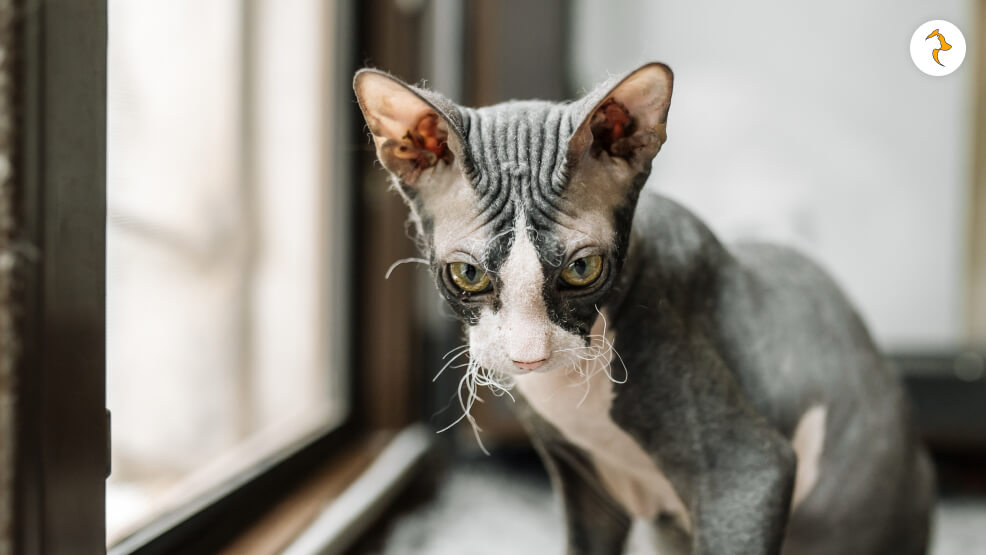
Old cats (older than 10 years) may be plagued by:
- Arthritis (mobility issue to access litter box)
- Cognitive dysfunction (forgetfulness or confusion)
- Kidney disease (more frequent use of the box)
In those cases:
- Utilize a low-entry litter box
- Place several boxes strategically around the home
- Investigate night lights to help lead them safely
- Regular geriatric vet checkups
When to Call the Veterinarian or Behaviorist?
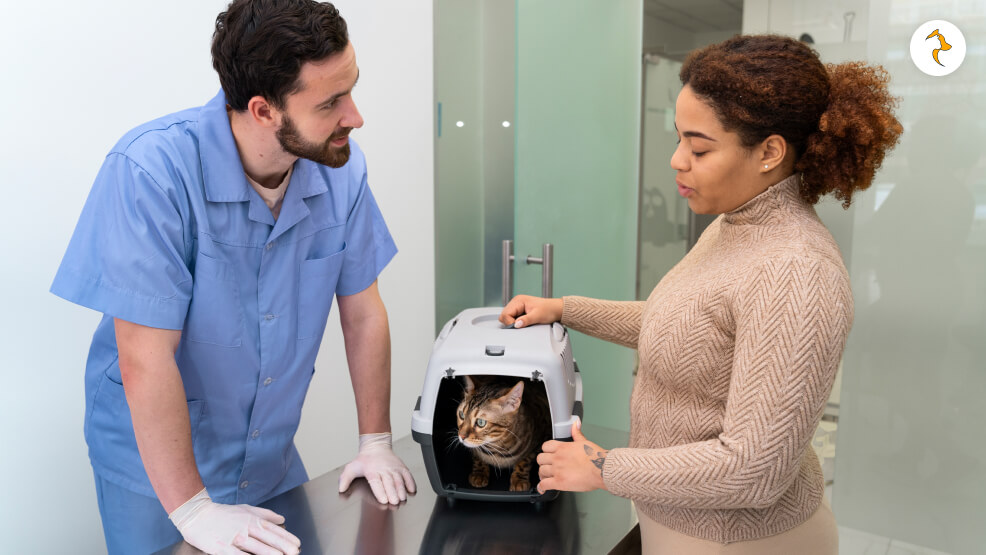
Call your vet immediately if:
- The behavior is sudden or new
- You notice any sign of illness: straining, blood, weight loss
- Your cat is over 7 years old and starts to have accidents
Once medical causes are ruled out and the behavior continues, work with a certified feline behaviorist to create an individualized behavior modification plan.
Why Did Your Cat Urinate on Your Bed?
Because your cat is trying to tell you something.
Whether it’s pain, fear, anxiety, confusion, or a dirty litter box, inappetechuria is never arbitrary and spiteful. It’s always a call of unmet needs, and if you can identify and address the source, you can fix the problem almost every time.
Fast Takeaways:
- Address medical issues first
- Don’t chide—apply positive reinforcement
- Clean with enzymatic cleaners to eliminate odor
- Read the emotional context
- Crash repeat accidents with bed protection and litter box modification
Your patience, love, and tested techniques will get your cat out of the bed—and your bed will stay dry and clean.







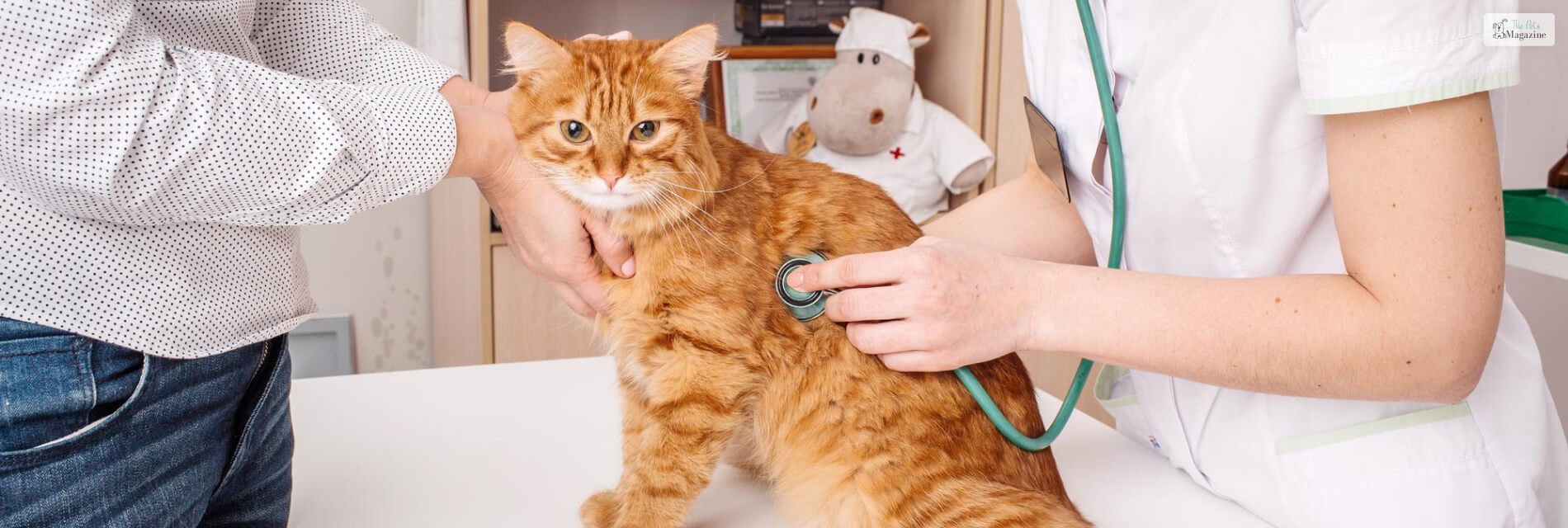

Leave A Comment